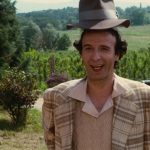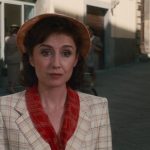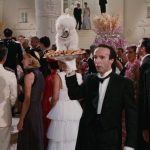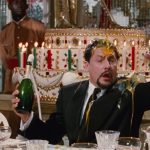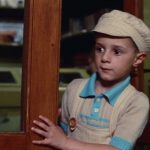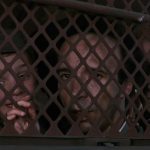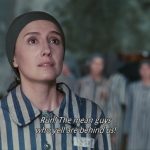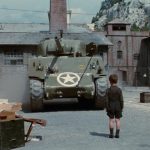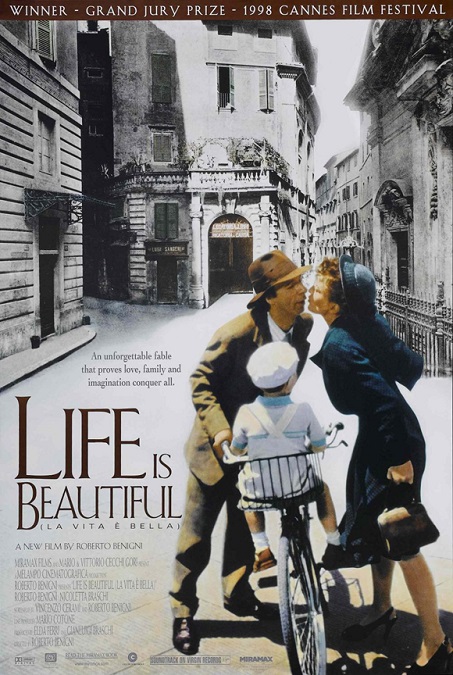
Life is Beautiful – 1998
This was an Italian film that was subtitled. It was good enough in its own right, but I didn’t feel like I connected with the strange style of the film. That doesn’t invalidate what the movie was trying to do, but I think it did blunt its effectiveness for me. The first half of this movie was ridiculous. But I get it. It was set-up for the dramatic moments of the second half, because it was sprinkled with signs and clues about what was to come. But for my tastes, the first half of the movie was ruined by the film’s writer, director, and lead actor, Roberto Banigni. I’ll explain.
The movie was about a care-free Jewish man in Italy named Guido, played by Banigni. He was a ridiculous clown whose style of comedy, which the film tries to pass off as charm, would earn him the anger and ridicule of most sane people. He ran the gamut of silly Vaudeville comedy from funny stories to slapstick antics and pratfalls. But the trouble was that it was rarely very funny. Instead, I was just rolling my eyes because he wasn’t getting beat up or jailed. Some of his comedy actually reminded me of Red Skelton, or Charlie Chaplin.
The first half of the movie showed his pursuit of a lovely girl, Dora, played by Nicoletta Braschi, Banigni’s wife. It was a fairy-tale. It was silly and unrealistic, though I must admit that the writing was clever in the way it tied together many of its silly, random occurrences and characters, to magically make true love blossom between Guido and Dora. But that brought us to the second half of the film, which follows the blissfully happy couple and their young son, Giosue, played by a 5 year old Giorgio Cantarini. World War II gets going and the family is torn apart. Guido and Giosue are taken by the Nazis. Knowing that her husband and child are being taken to a concentration camp, Dora demands to be allowed onto the same train, and goes voluntarily. In order to shield his young son from the horrors of the concentration camp, Guido makes surviving into a child-like game that Giosue can understand. He cracks jokes and pretends that everything is really OK.
The second half of the film was played much more seriously, and the humor, though still clearly present, lost some of its silliness. The feel of the film became much darker and more intense, culminating in the climax in which Guido, after assuring that his son was well hidden, goes looking for his wife, and is murdered by a Nazi soldier. As the Nazis are abandoning the camp and leaving their prisoners behind to go free, they fail to find Giosue in his hiding place. The next morning, after the only remaining people in the camp are Holocaust survivors, the boy comes out of hiding and is found by American soldiers. Among the other survivors is Dora. The film closes with their reunion.
Many people thought that the movie was far too insensitive to the true horrors of the Holocaust. Some of them were hinted at, but never really seen, except for a single frightening shot of Guido standing in front of a smoldering mountain of naked, skeletal corpses. The gas chambers were mentioned, but our main characters are never forced into them, though I’ll admit that a minor character, Uncle Eliseo, played by Guistino Durano, is shown undressing to go into one.
See, I understand what the movie was trying to do. It was not about the horrors of the war, but of the power of love, innocence, humor, hope, and courage in the face of the war. It is a great sentiment, but it was that very thing which blunted the intensity of the dark drama. The fact that the little boy came through the experience without a scratch, either physically or emotionally, was unrealistic. His mother survives and he finds her happy and safe. And though his father died, he fondly remembers him as a courageous savior.
Now, of course, I would be remiss if I didn’t mention a couple of other actors who did just fine. Amergio Fontani played Rodolfo, the mean man who was the accidental target of a lot of Guido’s silly behavior. For example, after he is a jerk to Guido, Guido clownishly knocks a flower pot onto his head from a second story window. Then when he runs down to apologize, carrying six eggs in his hands, instead of putting the eggs back in his own pockets, he puts them in Rodolfo’s hat. The angry Rodolfo thrusts his hat back on his head, getting egg all over himself. That’s comedy, folks! Right? I was surprised he hadn’t gotten a pie in his face before the Nazis took Guido and his family away. But not to worry. He got a second egg dropped on his head before that happened.
And then there were the three throw away characters, Horst Buchold, playing Dr. Lessing, a Nazi who liked Guido because he was a challenge at riddles, Dora’s mother, played by Marisa Paredes, and Ferruccio, Guido’s friend in the first half of the movie, played by Sergio Bustric. These parts could have been taken out of the movie and nothing would have been missed. Well, maybe Dr. Lessing was there to show how selfish and uncaring the Nazis were. But they were all overshadowed by Banigni and his Vaudeville shtick in the first half of the film, and his desperate efforts to shield his son from the horrors of the concentration camp in the second.
